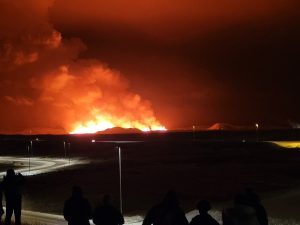Lava from a volcano on Spain’s Canary Islands has reached the sea 10 days after wiping out hundreds of homes and causing the evacuation of thousands of residents.
Columns of steam that experts had warned could contain toxic gases shot upward when the bright red molten rock tumbled into the Atlantic Ocean at 11 p.m. on Tuesday.
The area had been evacuated for several days as authorities waited for the lava to traverse the 6.5 kilometers (4 miles) to the water. Its erratic flows and changes in the terrain had slowed its progress. Authorities established a security perimeter of 3.5 kilometers (2.1 miles) and asked residents in the wider area to remain indoors with windows shut to avoid breathing in gases.
Lava flows from the Sept. 19 eruption on La Palma have destroyed at least 589 buildings, mostly homes on the island’s southwestern side that were caught on a slope below the volcano.
No deaths or serious injuries have been reported, thanks to the prompt evacuations of over 6,000 people in the first hours after last week’s eruption.
Also read: Lava flowing from erupting volcano in Spanish island rages toward sea
Just before it poured down a cliff into the sea at a local point known as Los Guirres, the lava rolled over the coastal highway, cutting off the last road in the area that connects the island to several villages.
La Palma, home to about 85,000 people, is part of the volcanic Canary Islands, an archipelago off northwest Africa. The island is roughly 35 kilometers (22 miles) long and 20 kilometers (12 miles) wide at its broadest point.
Cleaning crews swept up ash in the island’s capital of Santa Cruz, while more small earthquakes that have rumbled under the volcano for weeks were registered by geologists.
The airport on La Palma, an important tourist destination along with its neighboring islands, remained closed due to a huge ash cloud that Spain’s National Geographic Institute said reached up to seven kilometers.
Also read: NASA launches climate tracking satellite Landsat 9 from California
However, Laura Garcés, the director of Spain air navigation authority ENAIRE, said that she does not foresee any major problems for other airports on the archipelago or major air routes.
Experts have said that it is impossible too early to determine how long the eruption will last. Previous eruptions in the archipelago have lasted weeks, even months.






